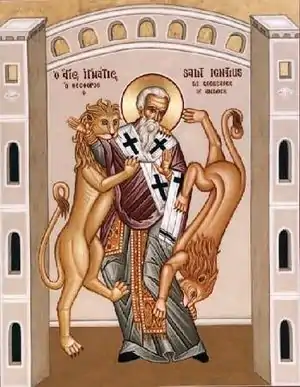Pseudo-Ignatius
Pseudo-Ignatius was a 4th-century writer who claimed to be Ignatius of Antioch. He is the author of the Ignatian forgeries but he also wrote the Apostolic Constitutions and a Commentary on Job. Harnack also identified Pseudo-Clement with Pseudo-Ignatius.[2][3][4] Pseudo-Ignatius has some Arian leanings but is not completely Arian; on the other hand, he in some ways resembles the Apollinarians. However it is not possible to draw clear conclusions on his Christology.[1][5][6]

According to Bart D. Ehrman, the writer likely claimed the name Ignatius to bolster his own theological views.[7]
Theology
Pseudo-Ignatius opposed asceticism and he had Arian leanings.[8][9] In the Apostolic Constitutions, he held 1-3 Maccabees, 1-2 Clement and possibly Judith as canonical (however some manuscripts lack Judith), but denied the canonical status of the Book of Revelation.[10]
Pseudo-Ignatius in the Apostolic Constitutions affirmed peadocommunion.[11] and Baptism by immersion.[12]
Writings
Epistles attributed to Pseudo-Ignatius include:[13]
- Epistle to the Tarsians
- Epistle to the Antiochians
- Epistle to Hero, a Deacon of Antioch
- Epistle to the Philippians
- The Epistle of Maria the Proselyte to Ignatius
- Epistle to Mary at Neapolis, Zarbus
- First Epistle to St. John
- Second Epistle to St. John
- The Epistle of Ignatius to the Virgin Mary
- The Apostolic Constitutions
- Commentary on Job
References
- Ehrman, Bart D. (2013-01-10). Forgery and Counter-forgery: The Use of Literary Deceit in Early Christian Polemics. OUP USA. ISBN 978-0-19-992803-3.
- Schaff, Philip (2019-12-18). The History of the Christian Church: Vol.1-8: The Account of the Christianity from the Apostles to the Reformation. e-artnow.
- Julian, Bart Ehrmanas one; Antioch, of; Constitutions, who also wrote the Apostolic; Job, a Commentary on. "Pseudo-Ignatius - Wikisource, the free online library". en.wikisource.org. Retrieved 2022-06-17.
- Still, Todd D.; Wilhite, David E. (2016-12-01). The Apostolic Fathers and Paul. Bloomsbury Publishing. ISBN 978-0-567-67230-8.
- Young, F.; Edwards, Mark J.; Parvis, Paul M. (2006). Studia Patristica: Papers presented at the Fourteeneth International Conference on Patristic Studies Held in Oxford 2003. Peeters. ISBN 978-90-429-1885-6.
- Jasper, Ronald Claud Dudley; Cuming, G. J. (1990). Prayers of the Eucharist: early and reformed. Liturgical Press. p. 100. ISBN 978-0-8146-6085-0.
- Still, Todd D.; Wilhite, David E. (2016-12-01). The Apostolic Fathers and Paul. Bloomsbury Publishing. ISBN 978-0-567-67230-8.
- Ehrman, Bart D. (2013-01-10). Forgery and Counter-forgery: The Use of Literary Deceit in Early Christian Polemics. OUP USA. ISBN 978-0-19-992803-3.
- Anonymous. Ante-Nicene Fathers Vol. VII, Constitutions of the Holy Apostles.
- "The Canon of Scripture according to "The Apostolic Canons"". www.bible-researcher.com. Retrieved 2022-06-17.
- Hammond, Geordan (April 2014). John Wesley in America: Restoring Primitive Christianity. OUP Oxford. ISBN 978-0-19-870160-6.
- Schreiner, Thomas R.; Wright, Shawn (2007-01-01). Believer's Baptism: Sign of the New Covenant in Christ. B&H Publishing Group. ISBN 978-1-4336-6905-7.
- "Church Fathers: Spurious Epistles (Ignatius of Antioch)". www.newadvent.org. Retrieved 2020-07-25.